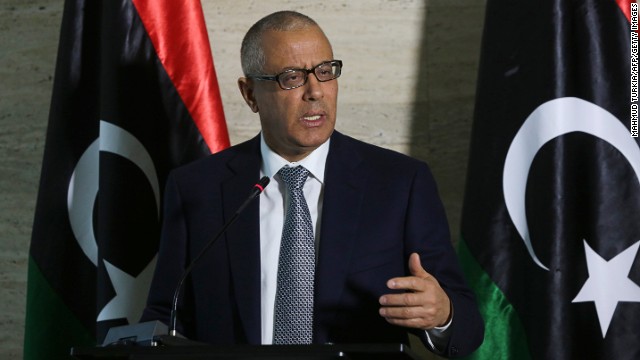Ousted PM left Libya on way to 'another European country'
updated 7:35 PM EDT, Wed March 12, 2014

Libya's Prime Minister Ali Zeidan speaks during a news conference on March 8, 2014 in the capital, Tripoli.
STORY HIGHLIGHTS
- NEW: Acting PM says predecessor free to leave, return for legal proceedings
- NEW: Abdullah al-Thinni says Libyan navy tracked oil tanker after it got through blockade
- NEW: The tanker took fire but escaped, he said
- NEW: Cairo says it will board the tanker if it enters Egyptian waters
Zeidan was in Malta late
Tuesday on a refueling stop for about two hours while en route to
"another European country," Maltese Prime Minister Joseph Muscat said in
televised remarks.
As of Wednesday, it was unclear which country that was or if he had arrived there.
Libya's acting Prime
Minister and Minister of Defense Abdullah al-Thinni told reporters
Wednesday that -- despite the prosecutor's order -- there was no ban and
Zeidan was free to leave.
"If there is a warrant
... if he is wanted by the judiciary, he can return and be held
accountable according to the law and international norms. And this is
not considered fleeing," al-Thinni said, contradicting an earlier
statement from the Ministry of Justice.
Hours earlier, the North
African country's parliament dismissed the prime minister after rebels
in eastern Libya said a tanker loaded with oil from a port under their
control escaped a naval blockade and moved into international waters.
Libya's prosecutor
general said in Tripoli he had banned Zeidan from traveling abroad
because of an investigation relating to a payment the government
allegedly made last year to an armed group blocking oil ports in the
east.
A copy of the travel ban, dated March 11, was posted on his press office's Facebook page marked "urgent and important."
"We order placing the
aforementioned in the monitoring database and banning him from travel
until he appears for the investigation," said the order, addressed to
the head of Libya's immigration department.
Oil chaos
The vote of
no-confidence came after Zeidan's failure to stop rebels from exporting
oil independently, the latest challenge in the vast desert nation's
bumpy transition.
The Libyan government
said late Monday it had taken control of the North Korean-flagged
tanker, Morning Glory, as it tried to leave the Al-Sidra port in eastern
Libya, and after having briefly exchanged fire with rebels. However, in
a sign of the chaos and conflicting information typical for Libya, the
rebels rejected the assertion.
On Wednesday, al-Thinni
said the tanker was at sea where Libyan military forces fired on it
until they were called off by the U.S. Navy for fear of an environmental
disaster. The oil tanker managed to sail away despite a fire on board,
he said.
A spokesman for Egypt's
military, Col. Ahmed Ali, told CNN on Wednesday that its navy will
monitor Egyptian waters for the oil tanker.
If the Egyptian navy
finds the Morning Glory in Egyptian waters, authorities will demand to
board and inspect the vessel to verify that the ship's cargo is legal
and properly authorized, Ali said.
Egyptian authorities will detain the ship if they find it to be violating of any laws or regulations.
Oil production, Libya's
economic lifeline, has slowed to a trickle since the summer as armed
protesters have seized oil ports and oil fields to press political and
financial demands. Oil revenue in the first two months of the year was
only 16% of what was expected in the budget, Deputy Oil Minister Omar
Shukmak said.
They are seeking a greater share of the country's oil revenue, as well as autonomy for eastern Libya.
Al-Thinni said the military would not fight the protesters in the ports.
"There will be no use of force against Libyan citizens," he said.
The conflict over oil
wealth is stoking fears Libya may slide deeper into chaos as the fragile
government fails to rein in the armed brigades that helped oust Moammar
Gadhafi in 2011 but now do as they please.
The removal of Zeidan, a
liberal weakened for months by infighting with Islamists, deepens the
turmoil in the country of 6 million people.
CNN's Sarah Sirgany, Marie-Louise Gumuchian and Saad Abedine contributed to this report
No comments:
Post a Comment